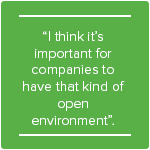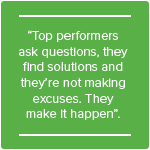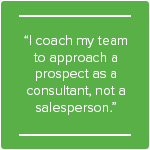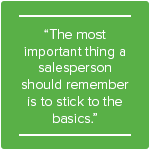
If you’ve ever wondered what top sales leaders are looking for when they’re hiring a new rep, this article should provide you with actionable insights that you can use in your next job search. I sat down with Kerry Webb, Director of Sales-New Business at Avast, and asked her a number of questions that our headhunters get asked all the time by sales professionals like yourself.

KERRY WEBB
Kerry has more than 20 years of experience, starting out as a sales rep before moving into leadership. Since the beginning, she has been a perennial top-performer – selling and leading teams in both B2C and B2B, inside and field sales. She has increased sales effectiveness by over 40%, has exceeded company sales goals by over 150%, achieved +725% YOY growth on new solutions all while achieving best in class employee satisfaction scores. She has been in the trenches and understands the challenges and the rewards that come with being out in the field, and she firmly believes that this has been instrumental to her success as a sales leader, and her effectiveness as a coach.
As a sales leader, how do you like to be approached by a salesperson who is interested in joining your team?
There’s no right answer to this. However, it feels very natural to be introduced by someone else – so a referral is great. A LinkedIn message is good as well. Someone who doesn’t approach you when the job is posted, but rather someone who wants to be ready and kept top of mind when a position becomes available. Some of the best people are telling you that they are interested before there is a position. Be proactive! It’s also important for the candidate to demonstrate that they’re positive and energetic as well – I’ve had a lot of people who have approached me and they’re personality and level of interest falls flat. So, there are two parts to this – there’s the way that they approach you and there’s the how. Having confidence, enthusiasm and a certain presence will make the candidate memorable and will make me think about him or her when the time does come to fill a position.
What are the things that you need to see in a sales resume before you consider bringing an applicant in for an interview?
That’s interesting, because I’m not as tough as other people that I’ve worked with. I don’t spend as much time on the resume as many other people do. I’m interested in their core competencies, so I’m usually willing to meet almost anyone. That said, I am looking for consistency – making sure there’s not a lot of gaps in employment and the length of time spent working at each organization. I’m looking at the type of work that they did, to determine if there are transferable skills. If you can find people who have done the job before then that’s great, but I like to give people a chance because I’m looking for the competencies more than I’m looking at what they’ve done. Their resume shows me where they’ve been and what they’ve done in a certain length of time, and it tells me whether it makes sense that they’re applying for the position that they’re applying for. Beyond that, I like to talk to people.
What are some of the traits that you’ve found to be synonymous in a top performer and that you look for in every hire you make?
Top performers are not in the noise. Every organization wants more leads, every organization wishes they had a better compensation plan, and every company has some turnover – but a top performer doesn’t talk about that. Rather, a top performer spends their time saying, “I need this and I need that, I tried this and I tried that” and they’re open and they’re asking for help and they’re just trying to make things happen. Top performers ask questions, they find solutions, they’re not making excuses, and they have a reason as to why they are approaching things a certain way. They make it happen – in their own way, and in their own time.
Furthermore, the top performer is a collaborative person. They’re very outspoken when it comes to what they need and they’re willing to ask more than one person for it. As the manager who works with someone like that, all it does is make things better. They are asking the right questions, they are being inquisitive and they are bringing up the right things. I’ve also found that they don’t want to be recognized, because they’re just so busy making things happen. It’s important for me as a leader to support that, and be available when they need something because when they bring something up, I know that that is something that we need to pay attention to.
Top performers can also be emotional, but they are inherently positive. They are internally driven and they believe that they can do anything. They are competitive and they are always urgent – they never stop when they are stuck. Top performers are motivated by money, but they also want to be the best. A top performer isn’t quiet, and they won’t let anyone beat them. They are also the best trackers of their sales. They are not afraid to call a customer if they are behind on their numbers – which in my experience in very rare. In fact, I would say that less than 10% of salespeople will pick up the phone and call customers if they are behind.
What are the things that you look for or want to address in an interview?
I want to know about their sales process, what motivates them and what kind of environment they are looking for – and then it’s all behavioral around those things, as I can build off of those answers. “What worked for you? What didn’t? Tell me about a time, tell me about a sale, explain your involvement in that sale, tell me why you picked that one to talk about?” This helps me to understand their passion.
I want to see what motivates them. I’ll ask standard questions like what kind of boss brings out the best in them, what type of environment brings out the best in them, if they could pick their job what would it look like, what does a day in the life look like, what’s your sales cycle, etc. But I’m really reading between the lines as I’m trying to identify what their motivators are.
At Avast, we’ve started to ask candidates to present to us. We ask them to sell us what they’re selling today. Like we’re a customer. We give them instructions on how to do it and then they present. This gives us a good indication of how coachable they are, if they can think well on their feet and if they can make it interesting.
How important is culture fit? How can both the salesperson AND potential manager screen for that?
In an interview, I’m assessing whether a candidate is a culture fit by first looking internally. Who do I have on the team today. What works? What’s missing? What can this person add to us? What’s going on in our world and could they handle it? So it’s being aware of what they’re looking for, what they bring, and determining if we need that in our environment at this time. Will it enrich what we have today?
One way that I’ve found to be successful when a candidate is assessing culture is to ask to come in and do a side by side, and I think it’s important for companies to have that kind of open environment. I like it when a candidate asks 
For remote employees, it’s crucial that they ask the right questions in the interview. They can’t be afraid to tell the hiring manager what they need to be successful. I would want to understand what kind of support they would need from me in order for them to be successful, because I can tell them right then and there if that’s something that can be done.
How do you position career growth to a potential hire? How do you address that question?
When a candidate asks me about career growth in an interview, I throw it back at them and ask them what kind of growth they’re looking for. In a perfect world, what would they like it to be? I will ask them where they see themselves in one, three and five years. I make it a point to always let people know that they have to do the job that they’re in or applying for first, and that they have to succeed in that role. You’ve got to prove yourself. If an organization is going to make an investment in you, it is essential that they see that that person is succeeding in their role before they decide to further invest company time and resources in their professional development.
What activities should a salesperson do outside of work to make a good impression on you?
It’s great to have interests and to talk about them. Show your passion. This is something I look for in a candidate when I’m interviewing. I want to know that they care about something and that it matters to them. This tells me a lot about a person, as I get an opportunity to find out more about their story. This also tells me that the person has a routine – that they’re disciplined, structured and determined. This is a clear indication that the person will be successful in sales. Involvement in networking groups, trade groups and associations is another one that I look for. Top performers are typically involved in some sort of external community of professionals. They know how important it is to have a network.
What “selling process” or sales methodology do you subscribe to, and how do you disseminate that to your team?
First and foremost, I emphasize what needs to be done on the front end. That’s where most of the work is done. You have to be proactive, and you have to get in front of people – whether that be through your network, through LinkedIn, by building a creative campaign or event. To be successful in sales, this is where you need to spend the majority of your time. Once you have identified a customer that wants to talk to you, you engage in a very detailed needs analysis and discovery phase. After the discovery, there will be some type of presentation, followed by negotiation and close. Too many salespeople go straight to presentation and then try to close, without doing the work on the front end, and this usually backfires. I’ve always been a firm believer in the Consultative approach. I coach my team to approach a prospect as a consultant, not a salesperson. To understand their business and to see where they can help. They shouldn’t have a solution for them at the first meeting, and they may not even have one tomorrow. But at least they’ve taken an inventory, and gotten to know their business. At some point down the line, there will be an opportunity where we can help.
We meet a lot of successful salespeople who are interested making some sort of a transition in their sales career – like selling a different solution or selling into a different vertical. How would those people best communicate their ability to make that transition successfully? How could they convince you that they were right for the job?
The first questions I would ask this person are as follows. “What are the differences between what you’re selling now and what you want to sell? What do you think are the similarities? How would you adjust to those differences, and what would you need to do to prepare yourself for those differences?”. If the candidate can’t make that linkage themselves, then they’re probably not going to be able to convince me.
In your industry, how important is it to hire a salesperson with an existing network in the space? Can a candidate with an understanding of the solution offering and a great track record in executing a similar sales process be just as successful? If so, how can they demonstrate that effectively?
A network can help you but I don’t think it stop you from succeeding. Everyone must start somewhere. In some circumstances having a network will give you an edge, but if you don’t have one, I want to hear how you are going to address the challenges you’ll be faced with by not having a network. You either have a network and you know how to leverage it, or you absolutely know what it takes to build one. In my experience, not a lot of salespeople have that skill. To have what it takes to start from scratch, and to be prepared to show me a plan on how they’re going to do it effectively is a huge asset.
What qualities and individual accomplishments do you look for when deciding who to promote into a leadership role?
They don’t need to be the top-performer, as top-performers don’t necessarily make good leaders. I look for people who have helped others naturally, so when there was a problem they’ve gotten people together to try to find a solution. They’ve taken on projects throughout their time that have not just benefitted them, but that benefitted the team. They get involved naturally with rewards and recognition and incentives. They are someone who people approach for ideas and solutions to problems because they’ve done it and they’ve put themselves out there. They’re not the quiet person in the room. They become the natural go-to person. It’s not a surprise when they want to become a leader because they’ve already been acting like it. They have proactively looked for opportunities that would benefit themselves and the team.
Who’s right to be a leader? I’ll always ask, do you want your success to be in the control of others? Or do you want to have control over it yourself? This is a critical question that makes them really question their ambitions to be a sales leader. I also ask them what their motivation is for wanting to become a sales leader. If it’s money and title, it’s the wrong person. A great leader is motivated by making a difference.
One of your strengths as a sales leader is to take an underperforming sales team and turn it around. What tactics do you advise your team to perform in order for them to turn around their own book of business?
You can’t be afraid of the cold approach, but you can’t just do calls. Calls don’t work – they have to be supplemented with other activities like leveraging their network to ask for introductions, posting on LinkedIn, sending out personalized emails with their picture, wishing them a happy holiday, etc. You must get their attention so that they’ll take your calls. That’s how you get in the door. This is basic, and the most important thing a salesperson should remember is to stick to the basics. Salespeople who try to do more than the basics don’t get a lot of time in their approach, as they are perceived to be junior. Most salespeople think that they’re better than the basics, but in my experience – the basics are best-in-class sales reps.
relpost-thumb-wrapper
close relpost-thumb-wrapper
Latest posts by Eliot Burdett (see all)
- 31 Must-Know Sales Follow-Up Statistics for 2024 Success – December 21, 2023
- 7 Success Characteristics That Define Top Performers – December 19, 2023
- 5 Reasons Your Top Employees Quit (Stop Doing This to Stop Them Leaving) – December 14, 2023







